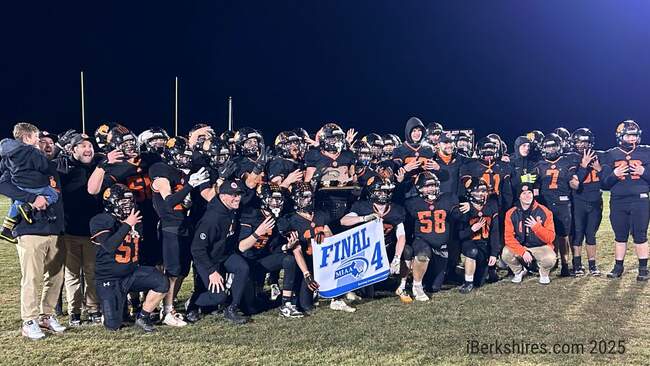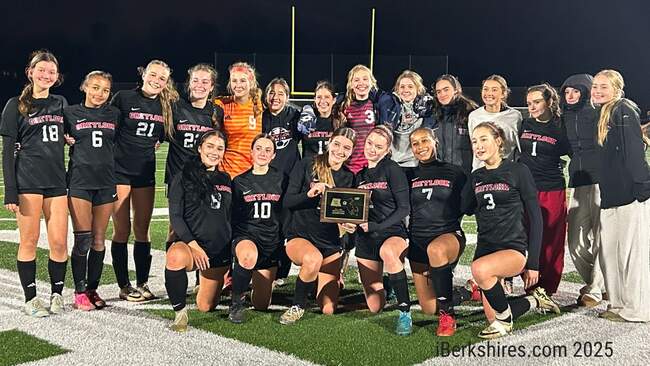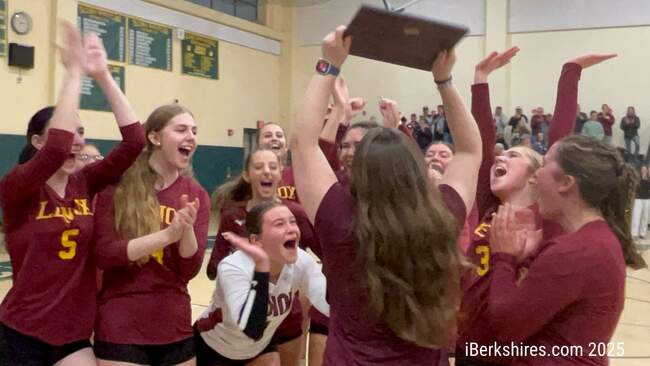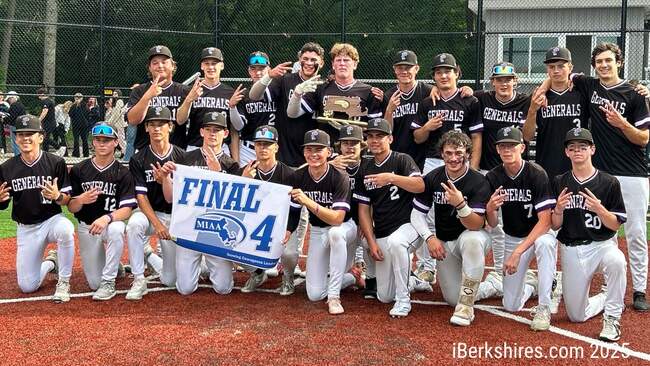Legislative Q&A: State Rep. William 'Smitty' Pignatelli
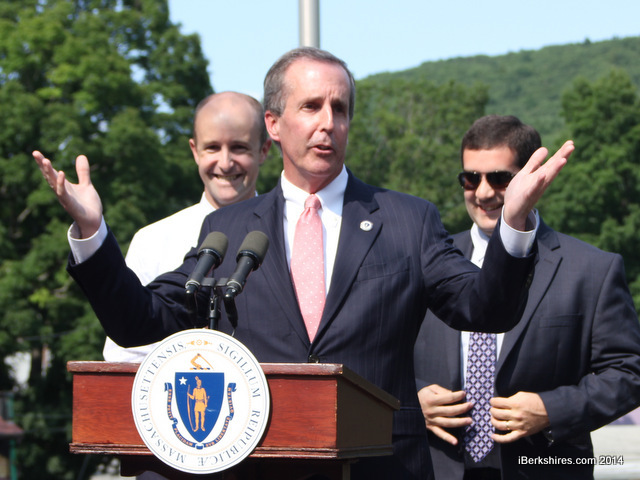 State Rep. William 'Smitty' Pignatelli at an event in Housatonic earlier this summer. State Rep. William 'Smitty' Pignatelli at an event in Housatonic earlier this summer. |
Eidtor's Note: This is the second in a series of Q&As with the Berkshire delegation that will run each Sunday over five weeks.
LENOX, Mass. — There will be a lot of new faces on Beacon Hill when the formal legislative session returns, but state Rep. William "Smitty" Pignatelli isn't concerned.
Pignatelli says even with a new administration and the nearly a quarter of the House of Representatives that could change, he says there is still enough stability to build on what the Legislature has been doing. In this last session, which just concluded, Pignatelli says he is proud of what the state has done but, he says, there is still a lot more to do.
iBerkshires.com sat down with Pignatelli recently in his Lenox office to get his perspective on both the last session and the next one.
Question: What were some of the highlights of this last legislative session?
Answer: I think it was very productive. I really do. We started to see some very positive trends of the economy turning around. We saw some positive trends of unemployment numbers going down, people going back to work, revenues going up, those kind of things. We hit some bumps in the road. We're not out of the water yet but we are a far cry from where we were when we really hit the wall in 2008 and 2009 and into 2010.
I think with what we've done in the Legislature, working with Deval Patrick, we are well positioned. Massachusetts, because of our fiscal responsibility, we were one of the last to fall into the abyss and because of the work we've done, we are one of the first to come out of it. There are only four states in the country that have over $1 billion of surplus. The other states are Alaska, Texas and Ohio, three states that are heavily dependent on oil. Massachusetts is right there with them. We are not dependent on one industry. We diversified. We are seeing a come back on manufacturing and I think we are positioned for things to really take off over the next calendar year.
But, we have a lot of work to do. This is not like the glory days of the '90s when my colleagues, who were there then, were telling me that money was cascading into the state during the Dot-Com boom. They couldn't spend it fast enough. But we're showing some fiscal discipline. We've made some good investments.
Obviously, what is going on in
North Adams with the hospital set the whole county into a tailspin. But, I think that has been stabilized. I think we are seeing companies like Iredale Cosmetics in Great Barrington making some major capital investments. The talk of the railroad is a long-term process but is $150 million. I think people are looking at the Berkshires very differently now and people are ready and willing to spend some money.
Q: What do you feel were important bills the Legislature was able to pass this session?
A: When we spoke about a year ago,
we talked about health parity for mental health and substance abuse. I think the substance abuse bill that we passed and he governor has signed is going to help, not necessarily stop but help, people who have been taken in by substance abuse, mainly heroin and prescription pills, throughout the county. It is a scourge on society and I think we've done some good things to get people treatment. I've always believed treatment is better than incarceration, for young people in particular. I think our bill will provide opportunities, for young people and their family, and an option.
When you go to Mountainside in Connecticut or McClain Hospital in Boston, it is $30,000 to $40,000 for a 28-day stay. What family can afford to do that? With the health parity and our substance abuse bill, I think it will provide more individuals and families that opportunity to get healthy.
The gun bill was very controversial in weighing the balances of the Newtown (Conn.) shootings, the drive-bys in Dorchester versus the sportsmen of the Berkshires. I think we were able to find that balance and I think it is very, very important.
Q: In this last session were there any things you were working on that you didn't get to see all the way through?
A: We're still working on things. The formal session has ended and anything that is controversial that doesn't get passed by midnight on July 31 is dead until the new session. But I still have a few things in play that I believe are noncontroversial. I think we've had a very productive year and I am pleased but we are still working. We're still running the clock out and hopefully some good things will come out of it.
Q: How does the state's finances look? What were you looking to do in the budget?
A: The state's finances are in good shape. We have the highest bond rating in the history of Massachusetts, which speaks volumes of the fiscal discipline we've had in good times and in bad. For borrowing money for economic bond bills or environmental bond bills, a half of a percent of interest or a quarter percent can save millions. I was really pleased with that.
For things I've been directly involved in, culture and tourism is the economy of the Berkshires. We need to try and diversify that a little bit. Our cultural facilities fund: I am very proud to say, me and Dan Bosley and Peter Larkin at the time, were part of this first in the nation fund that makes investments in our creative economy. We needed to keep that going and
the governor is buying into it and releasing a lot of those dollars.
I've done a lot of local bills. I went down there knowing that I am never going to be the guy to solve global warming. I'm not smart enough to do that. I really want to be a local rep, a constituent rep, with the nuts and bolts of the mom-and-pop issues that pop up here every day, like helping people get better employment, working with the Registry of Motor Vehicles, the list goes on and on with what we try to do.
Then, we are in position to help someone like Iredale Cosmedics expand. This is a $50 million, global corporation in 43 countries around the world and their home base is the 4th Berkshire District. That says a lot. We've made it very attractive for people to come here.
I think the IT bond bill for
that last mile of broadband, we are getting closer than every before. The bond bill the governor has signed will accelerate that last mile of fiber optic, broadband capabilities to every home and business throughout Massachusetts. I think that is going to pay huge dividends in economic development that some might not even realize — for the Iredales employing 150 people or the mom-and-pop shop in Sandisfield that needs to contact California or emerging countries all around the world. Broadband Internet is going to provide huge dividends. It's not happening quick enough but it is happening.
Q: Which committees were you on and what were they able to accomplish?
SP: I am on the cultural development committee. I've just touched on that. I'm on the higher education committee.
We did some very good things with the 50/50 split with [the University of Massachusetts] to try to control the rising fees for students going to UMass. It developed a cap of 50 percent with a 50 percent match from the state to try to keep the fees down for families. The state has really stepped up in a big way to invest in higher education and I hope in the next session we take it one step forward and the 50/50 split is not just for UMass but for every state college in Massachusetts.
I was somewhat disappointed that we didn't try to deal with the student debt situation. We've got
a good report that Rep. Paul Mark spearheaded and I think that is a great template for us to work on. I hope we can really put some teeth behind legislation for solutions to curb the student debt.
The other part on higher ed is when you look at our state colleges, the average graduation rate is six years. Why is that? We need to address that. It is hard to have a six-year graduation rate from a state college and have that student debt conversation at the same time. That is two extra years of tuition, two extra years of loans, two extra years of overhead for the colleges. Let's see what we can do with K through higher ed to get kids prepared for college so they aren't spending money on remediation and get kids graduated in four years. That would save a lot of money. I hope we have a very aggressive next session when it comes to higher ed.
My other committee is Ways and Means. We see every bill go through the Legislature. There was over 7,000 bills filed this year and they all eventually go to Ways and Means. I love Ways and Means. You are in a position to shape what our budgets look like. We've done a lot of good things preparing the whole state financially with the high bond rating and the investments we made.
Q: What do you expect to be big issues in the next session?
A: I hope to be re-elected, No. 1.
We'll have a lot of new members. There are a number of retirements. Another one of my House colleagues have resigned the other day to take a job in the private sector. We are anticipating up to 40 new members of the House of Representatives. That is 25 percent new membership in one election. So, I think we have a learning process to go through there. We'll have a new governor and we'll have to deal with whoever he or she is and the new agenda from the new administration.
But I hope that the work we've done over the last six or eight years could continue on and the economy can continue on, get people back to work and to reverse the trend of the exodus of people from the Berkshires, the young people particularly. Having a job is the greatest social program you could ever have and having an economic opportunity, a job, will allow young people to stay in the Berkshires, buy a house, start a family and settle down. It is very expensive to live in the Berkshires, especially in my district. You have to have a pretty decent job to buy that house. That is why I am very hopeful and optimistic about the Eagle Mills in Lee. Lee is becoming a destination and not just a gateway to the rest of the Berkshires. I'm working very closely with town officials and Congressman Richard Neal in that regard. There is reason for hope and optimism.
A: We've had several meetings with the Tennessee gas line folks. I'm getting very frustrated with the process because they have been very non-committal. I hate to use the word evasive but not forthcoming with answering some of the questions we have. Maybe they don't have the answers but maybe they do. They're not telling us and that's a problem. They've had a horrible PR campaign. I think they need to step back and revisit the whole thing.
Several town officials have raised concerns or said yes to surveying today and then withdrawing it tomorrow. They are not getting the answers they are looking for. We need to know what role we have as state legislators and local officials. The only people who can answer the us versus FERC — the federal agency — is our federal delegation. I've had conversations with Congressman Neal and email exchanges with Sen. [Elizabeth] Warren and Sen. [Edward] Markey's office.
We need answers. We can't make an informed decision without answers and right now we don't have enough to justify to me that there is a benefit to the Berkshires. To have a pipeline rip through Kennedy Park or cross the Housatonic River, go up to the Pittsfield watershed, you'll have to do a hard sales pitch on me to justify the devastation of our natural resources without a direct benefit.
The Rest of the River, [state Sen. Benjamin Downing and state Rep. Tricia Farley-Bouvier] have had regular meetings. We've met with Congressman Neal and the EPA folks. That process is long and entailed but we've got our hands into it and we're trying to gather as much information as we can. I have to tip my hat to the EPA. They've been answering the questions. They may not be the answers I like but at least they aren't being evasive. This will continue well after the new year and beyond.
We have to think of the negative economic impacts of this river cleanup. It is one thing to see what they did in Pittsfield but you also have to keep in mind how they did it. They were able to access it from East Housatonic Street or Elm Street, Newell Street. How do you get to the river from East Street in Lenox without blasting something through the woods to get an access road? Do they have to get it out by rail or does it have to be by truck? If it is by rail, I feel much better about it. If it is by truck, I've got some serious problems with it because of the economic impact it will have by tearing up the roads and disturbing neighborhoods. Those are kind of questions we are asking and we will see what happens when they come out with their decision.
Q: Are you currently crafting any legislation to introduce next session?
A: There has been some talk about the senior tax work-off programs. What we're starting to delve into is now that the minimum wage is going to be increased, that means there will be less hours for the senior work-off program because that is tied to the minimum wage. Maybe we need a sliding scale. I am think about crafting some legislation that will have the hours increase coinciding with the minimum wage. If you worked 1,000 hours as a senior volunteer and minimum wage goes up a dollar then maybe you only work 950. If it goes up to $10, then you work only 900. We're getting less service. So I think the hours should be 1,000 hours and whatever the minimum wage is, the minimum wage is. That is going up over the next three years and that is good.
I've been working and it is still in play now on this acupuncture bill. This would be a mandated benefit for insurers to cover acupuncture. We're having some great success with it. Dana Farber is currently using acupuncture to treat cancer patients. Baystate Hospital is Springfield is having great success with acupuncture for people with chronic pain. The New England School of Acupuncture, which actually I am the commencement speaker at their graduation Saturday morning, just landed a very nice Department of Defense contract to treat PTSD with acupuncture. These are non-invasive treatments, non-drug treatments.
We could talk again about prescription drugs and the abuses going on and the social cost but here is something that doesn't have any addictions or side effects. Acupuncture is something we are educating more people on. It has made its way through all of the committees and we are just awaiting the financial impacts, which we should have in October. We still could pass it this year but if not, I am going to tee that one up.
Tags: Berkshire delegation, legislators, Q&A, representative, state officials,
 State Rep. William 'Smitty' Pignatelli at an event in Housatonic earlier this summer.
State Rep. William 'Smitty' Pignatelli at an event in Housatonic earlier this summer.
